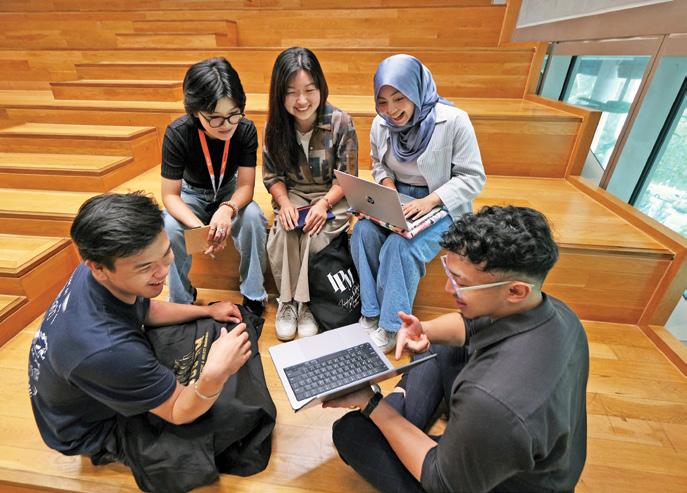
BACHELOR’S DEGREE PROGRAMME




The four-year direct honours Infrastructure and Project Management (IPM) programme at the Department of the Built Environment (DBE) offers a unique, interdisciplinary path to a Bachelor of Engineering degree. Rooted in Singapore’s dynamic construction industry, it blends engineering, management, finance, and law to tackle complex built environment challenges.
With the constantly evolving nature (i.e., through new construction, retrofitting and conservation) within the built environment both in Singapore and beyond, a foundation in IPM applies locally and globally, even empowering graduates to excel in leading tech sectors.
A hallmark of IPM graduates is their ability to communicate and collaborate effectively, uniting various professionals to deliver projects in any domain. We aim to shape outstanding communicators, team players and leaders. If you enjoy managing projects, especially in the built environment, IPM is an ideal choice.
The IPM curriculum grounds undergraduates in core project management principles, with electives in cost and contract management, asset and facilities management, and sustainable green buildings.
During the first two years, students complete essential IPM and engineering core courses. In the third and fourth years, they can pursue one of the following pathways or build a hybrid portfolio consisting: 1) Cost and Contract Management, 2) Asset and Facilities Management, and 3) Sustainable and Digital Technologies.
The course aims to equip students with essential skills in contract management, cost control, and project planning, all of which are increasingly in demand in the construction and infrastructure sectors. Through this, students gain both a strong foundation in critical areas of project cost and contract management, as well as the flexibility to explore specialised topics that align with their career interests.
IPM undergraduates are trained to be next generation leaders and world class managers in sustainable asset and facilities management. The IPM programme prepares students for new opportunities, including changing demographics and AI digitalisation. They gain new skills to
excel across geographies and market segments. Rapid industry transformation has created ready job opportunities in managing building and property portfolios, digital infrastructure, and data assets. The IPM curriculum is designed for direct industry application, leading to exciting careers in the built environment and financial institutions (FIs) like Singapore Real Estate Investment Trusts (S-REITs) and private equity (PE) funds. IPM students acquire new foundation knowledge in interdisciplinary engineering, systems thinking, smart facilities management, digital twin, ESG, finance and corporate governance.
Project Manager (Built Environment or other sectors)
Sustainable and Digital Technologies
Develop competencies in creating green, sustainable built environments, including passive/active design strategies, solar photovoltaic deployment, renewable energy certificates, and scope 1–3 emissions. Work in interdisciplinary teams to apply project management, finance, engineering knowledge to green developments, and environmental, social and governance (ESG) management. Learn digital tools such as Building Information Modelling (BIM) and AI for data-driven decisions. You will be prepared to advance sustainable initiatives locally and globally.
Environment Sector
Quantity Surveyor (Cost & contract management)
Sustainability/ ESG Consultant Energy Manager Infrastructure & Facilities Manager
Many others!
With increasing attention by global and local organisations on sustainable green buildings, this specialisation in Sustainable Green Buildings aims to provide you with specialised knowledge and skills to be future leaders in the area of sustainability for the built environment.
IPM is both ‘hard’ and ‘soft’ depending on how you customise your curriculum through specialisations, second majors and minors. You decide how your IPM journey is going to be. Are you going to be a project manager? An asset manager? A building scientist? A data analyst? A construction dispute analyst?
IPM students take a variety of specialisations, second majors and minors including:
• Specialisation in Sustainable Green Buildings
• Second major in
• Economics
• Life Sciences
The courses provide you with the competencies and knowledge in topics such as passive and active strategies, solar photovoltaic deployment, renewable energy certificates, and scope 1–3 emissions.
You will have the opportunity to work in interdisciplinary teams to develop a green development, utilising knowledge spanning across project management, project finance, and engineering.
• Psychology
• Quantitative Finance
• Sustainable Urban Development
• Minor in
• Cities
• Communications and New Media
• Community Development and Leadership
• Data Analytics
• English Language and Linguistics
• Entrepreneurship
• Film Studies
• History
• Infrastructure Management and Finance
• Psychology
• Urban Studies
In your first year, you will read the Digital Construction course as part of your core curriculum. Using the Rhinoceros 3D modelling programme, you may choose a building within the NUS campus and conduct field surveys to create models from scratch.
Following that, using ClimateStudio, an environmental performance analysis software, you will perform various building performance simulations, including daylight, solar radiation and energy analysis. After deriving the baseline energy use, you may propose targeted energy efficiency measures to reduce the buildings’ Energy Use Intensity (EUI).


After the course, you host your models and contributions on a crowdsourced digital twin of NUS, alongside tutorials and guides that you also develop.
The course helps you to acquire necessary skills in the digital age – from digitalisation to computer-aided design to running simulations towards sustainable design. These skills are highly sought after and position you well for roles such as sustainability consultants.
The NUS Digital Twin platform represents a significant step forward in the field of building performance simulation education. By leveraging the collective knowledge and efforts from students, the platform hopes to foster collaboration, knowledge sharing, and innovation in the field.

Scan here to explore the Digital Twin!

Haizul Ali Seron
Bachelor of Engineering (Infrastructure and Project Management), Class of 2026
• Welfare Director of the Building and Estate Management Society (BEMS)
• NUS Muay Thai Fight Team
• Owner of Zuron Home Systems (provides customised packages in the latest technology in smart home systems)
“The professors in the Department of the Built Environment have been especially supportive, creating a welcoming environment for learning. One standout experience was studying Research Methods under Dr Chew Lup Wai, whose genuine enthusiasm and engaging teaching style left a lasting impression. Many professors in the department share this dedication, making the learning journey both enriching and enjoyable. Currently, I’m on an internship, and the knowledge gained from my courses has made transitioning into the workplace seamless. It’s fulfilling to see how classroom lessons translate into real-world applications, making my time at NUS even more meaningful.”


Goh Ying Xuan
Bachelor of Engineering (Infrastructure and Project Management), Class of 2028
“My previous experience in Hotel and Leisure Facilities Management at Ngee Ann Polytechnic, combined with my time in the workforce, deepened my appreciation for facilities and project management. This course attracted me with its focus on addressing global challenges like built environment principle and practices, infrastructure and project management law and digitalisation transformation in the built environment. These prepares me for a dynamic workforce by offering practical, interdisciplinary knowledge applicable across industries.”
Ying Xuan joined the IPM programme through Advance @ NUS, an admissions pathway for adult learners to earn their first bachelor’s degree based on professional experience.

Rica Teo
Bachelor of Science (Project and Facilities Management)*,
Valedictorian of Class of 2023
Executive, Management Trainee with City Development Pte Ltd.
“The knowledge and skills I gained have been invaluable in my role as a sustainability consultant. The interdisciplinary curriculum, blending engineering, business, and management, provided me with a holistic understanding of infrastructure projects, which is crucial in addressing sustainability challenges. My hands-on experiences through internships and industry collaborations allowed me to develop practical skills that I now apply to real-world projects. NUS’s strong network and global reputation also opened doors for me in the sustainability sector, helping me to lead impactful projects focused on sustainable development.”
Bachelor of Science (Project and Facilities Management)*, Class of 2022
Executive Manager, Procurement Policies Department, Building and Construction Authority
“My programme was interesting and engaging for me, as its multi-faceted nature allowed me to be exposed to a wide variety of knowledge areas, from law, quantity surveying, project management, facilities management, smart applications and to green buildings. I could explore my interests in the different subject areas and delve deeper into those areas that fascinated me. I also developed soft skills on top of technical expertise that allowed me to excel in my work in terms of working effectively with multiple stakeholders and understanding the issues in the sector.“

*The BSc Project and Facilities Management was replaced by the BEng Infrastructure and Project Management in 2022 to enhance the engineering components of the degree.
Singapore-Cambridge GCE ‘A’ Level
A pass in H2 Mathematics or Further Mathematics.
Polytechnic Diploma
An accredited diploma.
International Baccalaureate (IB) Diploma
A pass in HL Mathematics: Analysis and Approaches.
NUS High School Diploma
A good major GPA in Mathematics.
International Qualifications
Applicants presenting international qualifications may apply with equivalent high school results.
